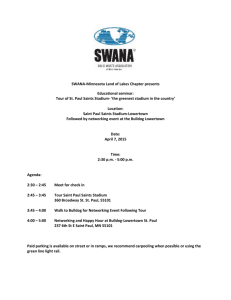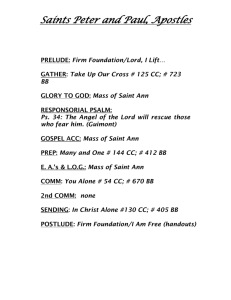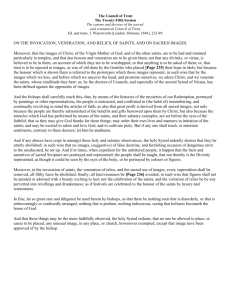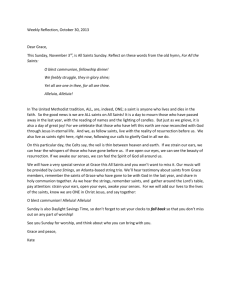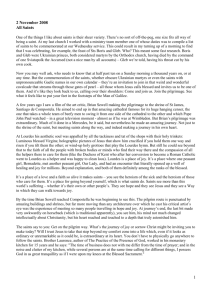Ampney Crucis Mothers` Union Talk
advertisement
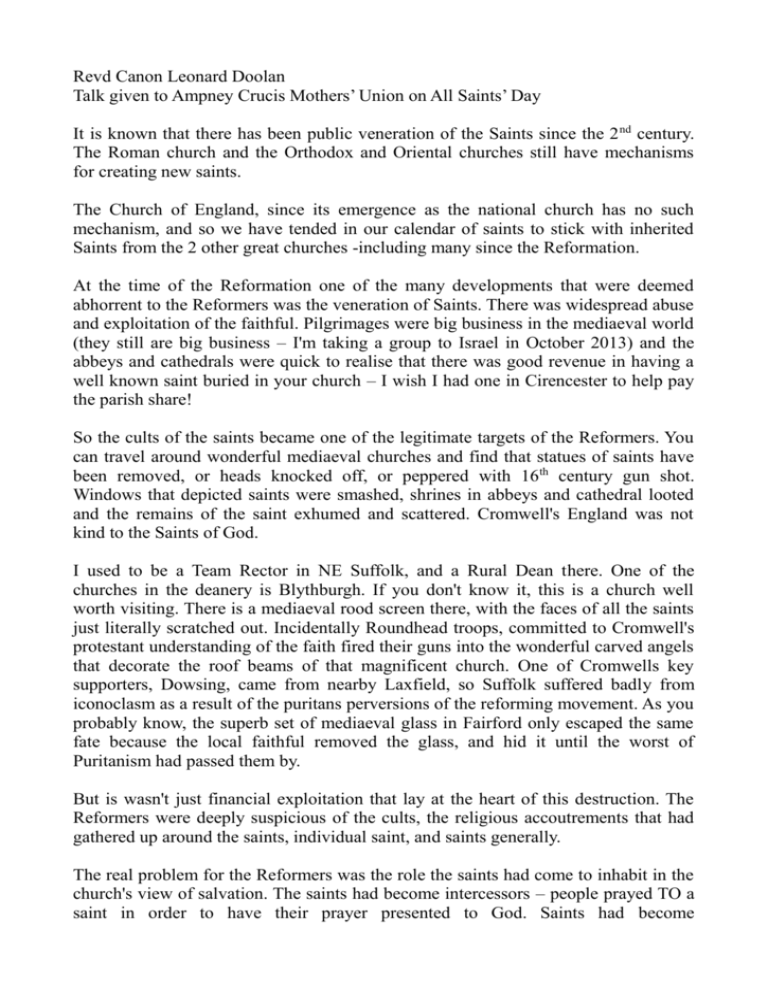
Revd Canon Leonard Doolan Talk given to Ampney Crucis Mothers’ Union on All Saints’ Day It is known that there has been public veneration of the Saints since the 2 nd century. The Roman church and the Orthodox and Oriental churches still have mechanisms for creating new saints. The Church of England, since its emergence as the national church has no such mechanism, and so we have tended in our calendar of saints to stick with inherited Saints from the 2 other great churches -including many since the Reformation. At the time of the Reformation one of the many developments that were deemed abhorrent to the Reformers was the veneration of Saints. There was widespread abuse and exploitation of the faithful. Pilgrimages were big business in the mediaeval world (they still are big business – I'm taking a group to Israel in October 2013) and the abbeys and cathedrals were quick to realise that there was good revenue in having a well known saint buried in your church – I wish I had one in Cirencester to help pay the parish share! So the cults of the saints became one of the legitimate targets of the Reformers. You can travel around wonderful mediaeval churches and find that statues of saints have been removed, or heads knocked off, or peppered with 16 th century gun shot. Windows that depicted saints were smashed, shrines in abbeys and cathedral looted and the remains of the saint exhumed and scattered. Cromwell's England was not kind to the Saints of God. I used to be a Team Rector in NE Suffolk, and a Rural Dean there. One of the churches in the deanery is Blythburgh. If you don't know it, this is a church well worth visiting. There is a mediaeval rood screen there, with the faces of all the saints just literally scratched out. Incidentally Roundhead troops, committed to Cromwell's protestant understanding of the faith fired their guns into the wonderful carved angels that decorate the roof beams of that magnificent church. One of Cromwells key supporters, Dowsing, came from nearby Laxfield, so Suffolk suffered badly from iconoclasm as a result of the puritans perversions of the reforming movement. As you probably know, the superb set of mediaeval glass in Fairford only escaped the same fate because the local faithful removed the glass, and hid it until the worst of Puritanism had passed them by. But is wasn't just financial exploitation that lay at the heart of this destruction. The Reformers were deeply suspicious of the cults, the religious accoutrements that had gathered up around the saints, individual saint, and saints generally. The real problem for the Reformers was the role the saints had come to inhabit in the church's view of salvation. The saints had become intercessors – people prayed TO a saint in order to have their prayer presented to God. Saints had become intermediaries. I don't know if you can remember the TV series Bread. This revolved around a Liverpool Catholic family. The mother was a zealot about her faith, but form time to time we could see the comic element in it. Whenever she prayed the Litany of the Saints, she would be slightly economic, 'All the saints on p.13 pray for us...'. I apologize for the charicature. The problem as discovered by the Reformers was that this type of 'cult' of the saints was entirely unbiblical. At the heart of the Reformation was a clash between standard church practice and the discoveries made both by reading the scriptures in the vernacular for the first time, but also the scholarship that excavated the Greek texts of scriptures. For several hundred years in the western world the scriptures were known only in Jerome's Vulgate Latin version. Corruptions of scripture had become possible, both in translation for Greek into Latin, but also how the church then created practice. It was impossible for Reformation theology to understand anything other than that Christ alone interceeds for us to the Father. Hebrews 4, 14, 'Since, then we have a great high priest who has passed through the heavens, Jesus the Son of God, let us hold fast to our confession. For we do not have a high priest who is unable to sympathize with our weaknesses, but we have one who in every respect has been tested as we are, yet without sin. Let us therefore approach the throne of grace with boldness, so that we may receive mercy and find grace to help in every time of need.' So we approach the throne through faith in him who has passed to there already – no one can do that for you. There is Christ who makes salvation possible, and there is the individual who must conform to faith. There can be no intermediary in this salvific process. Again, 1 Tim, 2,6 'there is one God there is also one mediator between God and humankind, Christ Jesus, himself human, who gave himself as a ransom for many.' Hebrews, 12, 24 refers to Jesus as the mediator of the new covenant. So the saints have no further mediatorial role, and therefore had no place in a reformed theology. Hence the destruction of their symbols and their cults. In many respects the only remnant of the prevalence of the cult of saints in the reformed Church of England rests in the names of the dedications of our mediaeval parish churches. So in our church we have no mechanism for creating saints, though we accept many of the pre-reformation saints now, and many of the post reformation saints of the Roman catholic church, though we attach to them to ability to interceed for us, or to be some sort of 'wing- shoed' Hermes delivering our messages to the throne of God. The Prayer Book of 1662 contains only the apostolic saints, Mary, Paul, John the Baptist, and Michael and all Angels – a greatly diminished fellowship, at least in number. However, the Church of England has developed its own Sanctorale (Calendar) because without the mechanism to first Beatify and then Canonize a holy individual, we have found that there are women and men, who since the Reformation, have had outstandingly firm faith in the face of danger, death, opposition, political, or social wickedness, or who have made a singular contribution through prayer or spiritual writing. Technically we cannot apply the word saint with a capital 'S' to such people, nonetheless we wish to commemorate them for their exemplary Christian behaviour. People such as Mary Slessor, Missionary in West Africa, 1915; John Donne, Priest and Poet. 1631; Caroline Chisholm, Social Reformer, 1877; Octavia Hill, who has recently been marked by a plaque in Westminster Abbey; and so the list goes on. Our Sanctorale is a blend of those people whose days are kept by the great churches of East and West, but also those who are particular to our own C of E and more widely in the Anglican Communion. As we have become bolder in rediscovering the place of saints in the piety of the church, without changing our doctrine of salvation in Christ alone, so we have been encouraged diocese by diocese, to create our own local calendar of holy women and men, and so we have such a local Sanctorale to supplement the national and ecumenical calendars of saints. But what is a saint? Most people would perhaps have asked this question right at the beginning of a presentation like this, but I like to be contrary! The dictionary says of the word 'saint' – One of those persons who are formally recognized by the church as having by their exceptional holiness of life attained an exalted station in heaven, and as being entitled to an eminent degree to the veneration of the faithful...' Of course this reads somewhat clinically as dictionaries tend to do, but such formality and dignity of description does tend to underpin the popular view of what the saints of the church are. This is not true of how the scriptures understand sainthood. Applying the same Greek word aghios which translates into Latin as sanctus, and in English saint, Paul begins his letter the baptized community in Rome,'To all God's beloved in Rome, called to be saints: Grace to you and peace from God our Father, and the Lord Jesus Christ.' Romans 1,7. Ending his letter, having listed a whole range of personal contact sin the church in Rome, he says, 'Greet Philologus, Julia, Nereus and his sister, and Olympas, and all the saints who are with them.' (Rom 16, 15.) I don't think Paul is referring here as a group 'entitled to an eminent degree to the veneration of the faithful.' Paul is simply referring to those who have gathered into community around their faith in Christ, no doubt baptized into the death of Jesus, and sharing in his risen life. He says the same in Corinthians, referring in Galatians to 'all the members of God's family'. And so it goes on. These are just real people, doing ordinary things, and who are members of the church. There is a rightful place for the church to honour those who are exemplary – but it must be because they inspire us to equal commitment, equal zeal, equal courage, equal response to the apostolic life. Rightly we keep this Feast of All Saints, and we rejoice that we are surrounded by a great company of the faithful, and pick up the language of Hebrews, the 'cloud of witnesses'. However, we must be clear that we are called to be saints; Indeed, that through baptism , we are the saints of God – not because we are super-human, not because we are immune from sin and temptation, not because we are better than those in our communities to whom we have to witness and minister, but because we are adopted by God in Christ. We are his family, a family of saints, proud to be related to Mary, John the Baptist, Peter, Paul, Ignatius, Augustine of Canterbury, Alphege, Martin Luther, Christine Rosetti, Janani Luwum, William Wilberforce, and so on – this is what is meant by that Prayer Book post communion prayer when it refers to the 'mystical body.' This mystical body is real – it is rooted in your Christian communities, in your churches. Let us pray: Almighty God, you have knit together your elect in one communion and fellowship in the mystical body of your Son Christ our Lord: give us grace so to follow your blessed saints in all virtuous and godly living that we come to those inexpressible joys that you have prepared for those who truly love you.; through Jesus Christ our Lord. Amen.


